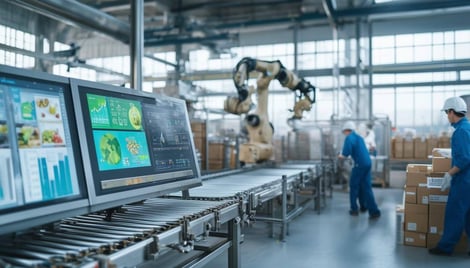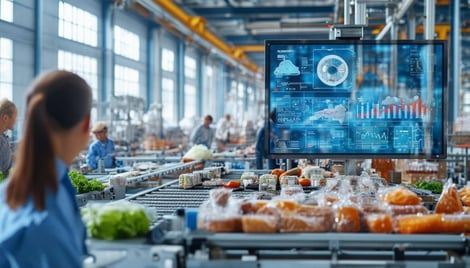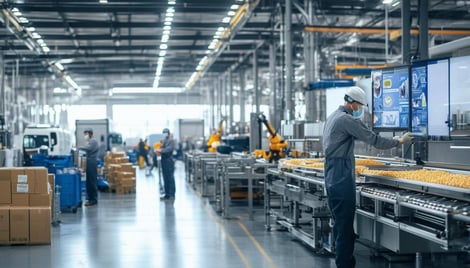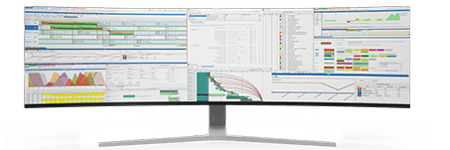
Information Technology in Global Manufacturing
In today's globalized economy, the food and beverage manufacturing sector faces unique challenges. These include stringent regulatory requirements, rapidly shifting consumer demands, and the constant need for operational efficiency. For Manufacturing IT Managers, navigating these complexities is a balancing act that requires innovation and precision.
As technology continues to evolve, integration platforms such as PlanetTogether and enterprise systems like SAP, Oracle, Microsoft Dynamics, Kinaxis, or Aveva are paving the way for smarter, more connected global manufacturing operations.

The Role of IT in Food and Beverage Manufacturing
Information technology in food and beverage manufacturing is no longer confined to the back office. It has become a critical enabler of real-time decision-making, operational efficiency, and compliance. Manufacturing IT Managers must oversee a wide array of systems, including enterprise resource planning (ERP), manufacturing execution systems (MES), supply chain management (SCM) software, and advanced planning and scheduling (APS) tools like PlanetTogether.
Key Objectives for IT Managers:
- Streamlining Operations: Automating workflows and reducing manual intervention.
- Ensuring Compliance: Maintaining adherence to food safety standards and regulations.
- Enhancing Agility: Quickly responding to market changes and disruptions.
- Improving Sustainability: Supporting initiatives like waste reduction and energy efficiency.
Achieving these objectives in a global manufacturing context requires seamless integration across systems and facilities.

Overcoming Integration Challenges
Global manufacturing often involves disparate systems and processes. A common hurdle is achieving seamless communication between legacy systems and modern platforms. This is where integration tools such as PlanetTogether APS shine. By connecting with systems like SAP, Oracle, Microsoft Dynamics, Kinaxis, or Aveva, PlanetTogether enables manufacturers to optimize production schedules, improve resource allocation, and gain visibility into their entire supply chain.
The Importance of Seamless Integration:
- Data Consistency: Ensuring accurate data exchange across systems prevents errors and inefficiencies.
- Real-Time Visibility: Integrated systems provide insights into production schedules, inventory levels, and demand forecasts.
- Scalability: A robust integration framework supports business expansion and adaptation to global markets.
![]()

Leveraging PlanetTogether with Enterprise Systems
PlanetTogether stands out for its ability to integrate seamlessly with major ERP and SCM systems, creating a unified ecosystem for manufacturing operations. Here’s how it works:
Integration with SAP
SAP is a leading ERP solution widely used in food and beverage manufacturing. Integrating PlanetTogether with SAP allows manufacturers to synchronize production schedules with supply chain data, ensuring that raw materials and finished goods flow efficiently through the value chain. Key benefits include:
Demand-Driven Planning: Aligning production schedules with market demand.
Reduced Waste: Minimizing overproduction and spoilage through precise scheduling.
Enhanced Traceability: Ensuring compliance with food safety regulations.
Integration with Microsoft Dynamics
For manufacturers using Microsoft Dynamics, PlanetTogether offers a plug-and-play solution to enhance production planning. Features include:
Dynamic Scheduling: Responding to unexpected disruptions such as equipment failure or supply shortages.
Resource Optimization: Maximizing equipment utilization and labor efficiency.
Scalable Operations: Supporting multi-facility coordination in global operations.
Integration with Kinaxis
Kinaxis is renowned for its supply chain management capabilities. Pairing it with PlanetTogether creates a powerful combination for end-to-end supply chain visibility. Benefits include:
Real-Time Collaboration: Enabling cross-functional teams to make data-driven decisions.
Risk Mitigation: Identifying potential supply chain disruptions before they occur.
Improved Forecasting: Leveraging predictive analytics to align production with demand.

Driving Operational Excellence with IT
Global food and beverage manufacturers are increasingly adopting advanced technologies to remain competitive. Manufacturing IT Managers play a crucial role in this transformation by deploying tools that drive efficiency and agility.
Key Trends in IT for Food and Beverage Manufacturing:
- IoT and Smart Factories: Connecting machinery, sensors, and systems to create a fully digitalized manufacturing environment.
- AI and Machine Learning: Enhancing predictive maintenance, quality control, and demand forecasting.
- Cloud-Based Solutions: Enabling remote monitoring and global collaboration.
- Blockchain for Traceability: Ensuring transparency and trust in supply chain operations.
By integrating PlanetTogether with ERP and SCM systems, IT Managers can harness these technologies to their full potential.
As global manufacturing grows increasingly complex, the role of IT in food and beverage production is more critical than ever. By leveraging tools like PlanetTogether in conjunction with enterprise systems such as SAP, Oracle, Microsoft Dynamics, Kinaxis, or Aveva, Manufacturing IT Managers can drive innovation, streamline operations, and meet the demands of a competitive global market.
The future of food and beverage manufacturing lies in intelligent, interconnected systems that enable agility, efficiency, and sustainability. For IT Managers, the challenge is not just to adopt these technologies but to integrate them in ways that create real value for their organizations.
With a clear strategy and the right tools, Manufacturing IT Managers can lead their organizations to new heights of success in the ever-evolving global manufacturing landscape.
Are you ready to take your manufacturing operations to the next level? Contact us today to learn more about how PlanetTogether can help you achieve your goals and drive success in your industry.
Topics: PlanetTogether Software, Demand-Driven Planning, Integrating PlanetTogether, Real-Time Collaboration, Streamlining operations, Data Consistency and Accuracy, Improved Forecasting and Planning, Food and Beverage Manufacturing




















LEAVE A COMMENT